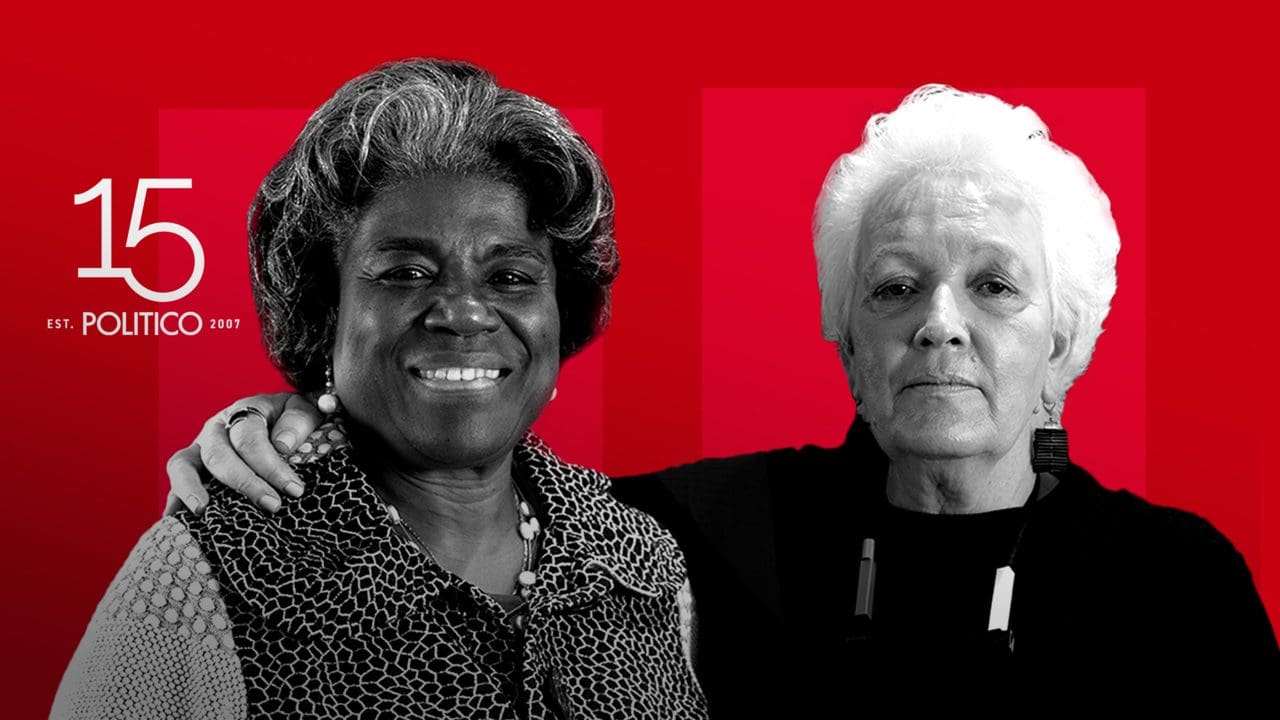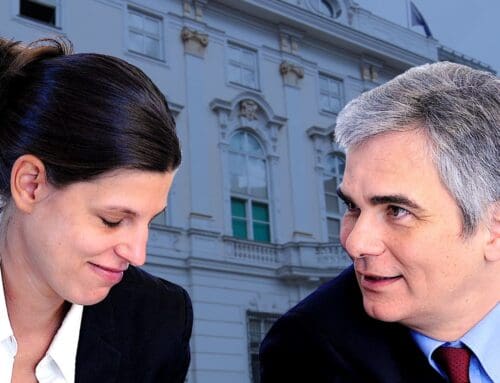
‘We Thought You Were Going to be a Good Girl’: Two Foreign Policy Dynamos Confront the Male World Order
Linda Thomas-Greenfield and Gayle Smith both know what it’s like to be the only woman in the room. “I seethe every time I think about it,” says Thomas-Greenfield, U.S. ambassador to the United Nations, recalling the moment at a U.N. meeting when a man across the table told her, “we thought you were going to be a good girl.“
Fearful of being labeled an “angry Black woman” she bit her tongue, and regrets it to this day.
In the latest installment of POLITICO’s 15 Conversations series, Thomas-Greenfield talks with Smith, a former USAID administrator, President Joe Biden’s global Covid response coordinator and now head of the ONE Campaign, about how to make sure more women are involved in crafting the future of the world — and why that would be better for everyone.
Smith, for example, thinks more women in charge of the global Covid response could have boosted its effectiveness. “I tend to think women are pretty good at process, and managing a global pandemic is a lot of process,” she says. “And I think that was missing.”
Still, Smith and Thomas-Greenfield are optimistic. Looking around the world today — from Iran to the U.S. — they see women becoming more political, more outspoken, and less willing to tolerate repression. It might take some time, but “I expect these young women to change the world,” says Thomas-Greenfield.
Held at POLITICO’s headquarters, this conversation has been edited for length. You can watch the video above and read a full transcript below.
Ambassador Linda Thomas-Greenfield So on Iran, it’s a question that we’ve been asked regularly: How can we be supportive of the women of Iran? And my response to that question is they need to hear from us. They need to hear that we give them moral support, but we can’t push them into the streets. They’re being courageous. They’re being brave, but they’re being killed. And so our support has to be moral support, but it also has to be in the area of accountability, like how do we hold the morality police accountable? So we put some of them under sanctions. I don’t know whether you think that that’s an approach we should take. You’ve done this kind of work before.
Gayle Smith Sure. I think the other thing that’s interesting about this is that Iran has been a foreign policy challenge for as long as I can remember. And here you finally have something happening which is fundamentally political. I mean, in the small “p” sense, right? It’s citizens. It’s women and girls of all ages saying “enough,” like, “we’re not doing this.” And I think that gives us an opportunity, not just, as you say, to stand with them, but to send a message that even in politics and in all these countries, women are a powerful force.
I mean, you remember, we both worked on Liberia for a long time. That agreement that finally came about that led to a woman becoming the president of Liberia (Ellen Johnson Sirleaf). Women had a whole lot to do with those negotiations.
But I think usually politics, foreign policy is talked about as though it’s just men.
Thomas-Greenfield I love you mentioning Liberia. I served as the ambassador to Liberia, and I saw those women at work. And the men were still problems in trying to move the country forward.
And as we look at the situation around the world where women have been engaged, you see change, you see movement. And we’re seeing movement in Iran: It’s happening. It’s happening [also] behind the scenes. The government of Iran wants to blame the U.S., they want to blame everybody for what is happening in Iran except themselves. But we need to applaud those women.
Smith I think we do. And I think we need to underscore the fact that they can blame whoever they want. [But] it is absolutely obvious that this is the female citizens of Iran. Nobody is telling them what to do.
They’ve taken the bull by the horns and they’ve decided they are going to plot their own futures, and you can’t propagandize yourself around or through that.
Thomas-Greenfield No, no.
Smith And it’s them. And I think we need to keep the spotlight on them, but stand absolutely with them. It’s extraordinary.
Thomas-Greenfield It really is.
Smith It’s one of the most inspirational things happening on the planet right now.
Thomas-Greenfield And it’s so inspiring to other women elsewhere in the world who are experiencing similar types of situations. Afghanistan comes to mind where the Taliban are forcing women to be accompanied by a man when they go in public, to completely cover themselves and not allowing them to go to school. And those women are demonstrating as well. We’re not seeing as much of it in the news as we’re seeing with Iran right now. But Afghan women are also being extraordinarily brave.
Smith Yeah, no, I saw a story about Afghan girls demonstrating that they wanted to go to school. And I mean, there’s a Washington politician who’s a big defender of our foreign aid budget who said, “You know what the Taliban’s afraid of? Taliban’s afraid of a girl with education.”
Thomas-Greenfield Yes. Yes. We’ve been engaging with other Muslim countries to get them to engage with the Taliban. Indonesia, for example, has been extraordinarily proactive in engaging the Taliban on how to address the issues of women in the Quran, because their interpretation is not an interpretation that has been bought into by so many other countries as well.
Again, we can’t take the Taliban at their word. We have to judge them on their deeds. But we cannot let the pressure up on them. And having the voice of the secretary general, having the voice of other members, the voice of other member states, but having women and girls express their own desires for freedom and for an education. I think it’s important for the Taliban to hear.
Smith It’s important and it’s very hard to turn that off. You can arrest and you can shoot and you can suppress. But I think once that’s out of the box, you’re going to have a whole lot of people who are going to be supporting, voting with, standing for those girls and women.
Thomas-Greenfield Absolutely.
Smith And I’m pretty sure the Taliban’s watching what’s happening in Iran right now as well.
Thomas-Greenfield They are watching that very, very closely. And they should be.
You know, I think people around the world watch what is happening in the United States. They look to us as an example of what they want. And occasionally we disappoint them.
And we’re seeing that disappointment now. But we’re also showing them that we can fight against these forces and raise our voices against these forces.
And I think that inspires other women around the world to see how women in the United States work to address the similar issues that they’re facing in their own countries.
Smith I think that’s right. And I think a lot of people watch the United States, you’re absolutely right. It’s also important for us to be humble in that and concede the point that we are imperfect. Which, by the way, I think helps us in discussions with other countries.
Because if we come in and say, well, we’ve got all sorted …
Thomas-Greenfield “Yeah, look, we got it right, just do it our way.”
Smith … That doesn’t work so well. And I think what we’re seeing is some huge obstacles, I think some steps backward [in the U.S.] But at the same time, more and more women, interestingly, I think across generations, are organizing, becoming more active in their communities, more active politically in the United States.
More and more women candidates running from the local level all the way up. And I think that’s a trend that’s not going to stop.
I mean, and again, I think any time that a people, whether it’s by virtue of gender or race or religion, is in a position of having its rights fully oppressed or chipped away at, they’re going to push back. They’re going to push back and they’re going to organize. And history shows that and I think that’s what we’re seeing in the U.S.
So I think we’ve got to keep that up and understand that the struggles of women around the world, they’re all on the same spectrum.
Thomas-Greenfield And they never go away completely.
Smith No, no.
Thomas-Greenfield We constantly have to keep fighting. We have to keep raising these issues. We have to keep advocating for women’s rights, wherever they are being pushed against wherever it happens anywhere in the world.
Smith And I think we’ve got to remind people that women and girls isn’t a side issue over here. It’s part and parcel of the social fabric in the body politic. And the minute we put it over on the side and say, let’s have a special initiative.
Thomas-Greenfield We sideline them.
Smith We’re compounding the problem.
Thomas-Greenfield So, Gayle, can I ask on Covid: How do you see us addressing those issues as we look at the impact that it has had on women? Did we take those kinds of issues into account?
Smith No. I think, unfortunately, the pandemic was politicized early on.
You know, the first early discussions was whose fault is this? And that’s an important issue, but that’s not generally your best starting point when you’re looking at the beginning of a global pandemic. I think what we know is that the health impacts are still very, very much in play.
The economic impact on women has been extraordinary. More women have lost their jobs. More women have suffered on the health care front because attendant health care [systems] broke down and women economically were hurt especially hard, including in low and middle income countries where a lot of women are in the informal sector. So there was no relief, there was no support, there was no backup.
And I think, you know, maybe if we’d had another set of actors in the room when the pandemic was first declared, we could have come out with a different system. And I think one area, had there been more women in the room, for example. I tend to think women are pretty good at process, and managing a global pandemic is a lot of process. How are we going to organize this? How are we going to organize that? Who’s going to take this responsibility? Who’s going to take that responsibility? And I think that was missing.
And of course, the biggest thing is that the world was and remains pretty fragmented.
Thomas-Greenfield And when you look at the inequities, in particular in Africa, where at the early stages, less than 10 percent of the population was vaccinated.
Smith It’s still low. And I think, look, I am proud of what the United States did, and [what] I think people like you and I were able to do together when I went briefly back into the administration, in terms of making vaccines available.
But I think, people growing up all over the world are going to have as one of their basic facts taught in school that when there was a global pandemic, wealthy countries had vaccination rates and access that was in the range of 70 percent plus. And poor countries were in the range of 14 to 20 percent.
Thomas-Greenfield Yeah.
Smith If you think about, for example, how do you take what we’ve seen about the role of women in peace building, in conflict negotiations and so on, how do we expand that and kind of build it into the system? You know, one of my colleagues always says, if you’re not at the table, you’re on the menu.
Thomas-Greenfield Yes.
Smith I think even when we conceive of peace negotiations, the main political players are often men. So we look to men for the solution rather than saying, who are the major stakeholders in the outcome of this?
Because the motivation, and men are stakeholders, men and boys are, but women and girls are big stakeholders in the outcome of a conflict resolution process. So they need to be there from the beginning rather than just being the beneficiaries. But I think we’ve got to flip it on its head.
Thomas-Greenfield Yeah, we tend to look at them as victims.
Smith Yes.
Thomas-Greenfield Victims who have to be addressed instead of seeing them as participants to addressing the problems of victimization that includes everyone.
And to get that across has been extraordinarily difficult, although I think we’ve made a lot of progress. But I will tell you, even today, I will walk in a room and look at the table, and there’s not a single woman sitting at the table but me.
Smith Yeah.
Thomas-Greenfield And so I’ve found that I have to — I can’t just sit at the table and not mention that.
Smith I imagine you call it out pretty quickly when you sit down.
Thomas Greenfield Yeah, I call it out quickly. But what has been surprising to me is how uncomfortable the men are. They do it and they know they should have women in the room. And when you raise it, they’re uncomfortable.
But they don’t make the decision upfront that it is important to have their women colleagues sitting at the table with them. And so for people like you and I, who always have a seat at the table, we have to be voices of advocacy for the women who are not at the table.
Smith I think that’s right. And I think the other thing is we’ve got to build out the pipeline of women that are coming into the systems, whether it’s in the U.S. government, whether it’s in departments, ministries, decision-making bodies around the world, because too often it’s the case that it’s men that need to decide whether they should include some other women.
We need to get to the point where it is men and women, women and men, deciding whether they’ve got the right delegation.
Right. But to do that, we’ve got to get more women in the system. And I think you and I have been at the work we do for a while.
Thomas-Greenfield Yeah.
Smith And I think in most countries around the world, including here, we’ve seen, I think, significant improvement there. Not enough.
And I think where we’ve seen the least is in the hard power, national security, negotiations over war, those kinds of issues. We’ve still got some serious work to do to get a better balance.
Thomas-Greenfield And in political power circles. So [Liberian] President Sirleaf has put together a mentoring program for young women engaged in politics. You know, from how you run a campaign to how you manage a political position. And we have to do more of that, because so many young women don’t get the mentoring, they don’t get the coaching. They’re not brought into the circle at a young age so that they learn it on the way up. And so many of them are not prepared for success.
Smith I think If we had a better gender balance in a lot of these places, processes would change, discussions would change.
Thomas-Greenfield And just to give you an example, rape was never seen as a tool of war. It was an action that was taken. And now we know that rape of women has become a tool of war. And it’s women that brought that to the table, so that we can hold people accountable. You know, we’re holding them accountable for atrocities: But rape is one of those atrocities.
Smith But, you know, part of the reason I think women raise that, in my experience — and I want to be very careful about making sweeping generalizations — I think women are more comfortable raising uncomfortable issues.
I have found in my work, in my personal life, I’m in a meeting. I’m waiting for a meeting. You’re at the airport. You’ve just met somebody who’s on the delegation from another country. If you’ve got two or three women sitting around, it takes about 4 to 7 minutes before your conversation includes things that are personal or sensitive, right. We are used to, [and] we talk about these things all the time and, I think, breaking through and raising issues that are taboo or that nobody wants to talk about.
Putting rape on the table as now an unfortunately increasingly common act of war and political violence, naming what happens to young girls who are HIV positive because they’ve been married young or they have no economic choice but to sell their own bodies. Putting those issues on the table, I tend to think women are more inclined to raise them.
Thomas-Greenfield We do and they’re not frivolous issues.
There was this tendency that these were side issues.
Smith “These are your issues. These are soft issues. Oh, we really should do something for you, Linda, on that issue. We can have a special event.”
No, no, no, no. We need to put this at the center of the table.
You and I have an advantage as women in a lot of the environments we’ve worked in because we’re tall. We say what we think.
I spent a lot of time in a lot of war zones. I know your story of Rwanda, where your life was at risk. So we don’t tend to be scared of anything. And I think if I was to say, what compromise have I made, I think early in my career — but not by much — there are probably some cases where I wish I had spoken up more forcefully.
I mean I may have raised the point forcefully, but having been voted down or countered, I’m sure there were some times that I didn’t say, “No, sorry, we’re going to go another round.”
Thomas-Greenfield I was sitting in a room in the past year and I had a person in that room say to me, „When you were selected for this position, we thought you were going to be a good girl.“
Smith Whoa!
Thomas-Greenfield Yeah, yeah. And I boiled over.
But I didn’t blow my top — and I’m angry at myself, today, that I didn’t blow my top.
Smith Huh.
Thomas-Greenfield I thought, OK, they’re pressing my buttons. I’m not going to let them press my buttons.
Smith So, did you call them out, but calmly?
Thomas-Greenfield I ignored it. And I am seething to this moment.
Smith Can you whisper to me who it is and we could go get them.
Thomas-Greenfield I’ll tell you later, but I’m seething. I seethe every time I think about it. And I’ve been waiting for the next moment — you never get a second chance to blow your top, I will say that.
And I’m sitting there and I’m like, if I blow my top, it’s going to be like an angry Black woman.
Smith Yep, yep.
Thomas-Greenfield So you’re not going to let your buttons be pushed. You’re going to show you’re an adult here and you’re going to just ignore that.
Don’t do that: You should never ignore an insult.
Smith I think you had the right to be an angry Black woman in that instance.
Thomas-Greenfield Never let anybody ignore an insult like that.
I didn’t ignore it, I mean literally. You know, and I guess my biggest fear was when I blew my top, the whole building was going to blow up. And I didn’t want that to happen.
I wanted to have a calm response, but I couldn’t have a calm response because I was so angry. And then after the fact, I stayed angry because I didn’t talk about it.
Smith Well I, yeah, I’ve done the same thing sometimes of just not saying anything and then wanting to go find them.
Thomas-Greenfield Well, my thing was, I was thinking that when Nancy Pelosi said the other day that she wanted to punch out a certain person [then President Donald Trump], that’s exactly the way I felt. Like, “I’m going to get up and just do this.” But I knew I couldn’t.
But I could have used my voice.
Smith Here’s the thing, can you, no, you can’t — punching somebody would not have been good.
But I think there is this message to women that you’re supposed to be a good girl, right.
If men in senior positions under stress lose their temper occasionally, it’s unpleasant, but it’s generally tolerated. And if women do, it’s perceived differently.
I’m optimistic in the environment that we’ve lived in — the policy, kind of Washington, kind of international affairs world — for a couple of reasons.
One is that I find young women, generally, or at least many of them with whom I work, it wouldn’t occur to them not to blow up. Right. Because they haven’t had 30, 40 years of being expected to be a good girl, of that kind of mantra being out there.
But the other thing is, I see a lot of different behavior in young men. And I think that’s a part of it, because it’s not just women walking in the room and asserting themselves: It’s men changing. And to be fair, there are a lot that have, but I’ve seen a real shift among people a lot younger than we are. It gives me some hope.
Thomas-Greenfield Yeah. I really feel hopeful because what I see is that these women are not forced to make choices that we had to make.
Smith Yes.
Thomas-Greenfield They don’t have to make choices. They just do it. And they have so many options that we didn’t have. And they know it and they’re empowered. And I am very, very hopeful.
I expect these young women to change the world. That my little four-year-old granddaughter, who says “I can do it,” is going to make a difference in the world.
Smith Yeah, it’s having the confidence to know you can do it as opposed to having to be told that you can.
Thomas-Greenfield Yes.
Smith If there’s somebody I was going to thank, certainly in this world of Washington, it would be Madeleine Albright.
You know, Madeleine Albright, secretary of state, ambassador to the U.N., she’s Madeleine Albright. But she was also a very regular normal human being, woman, mother. Right. She’s very accessible.
Thomas-Greenfield Grandmother.
Smith And grandmother and aunt. But she was also a mentor, friend and supporter to literally hundreds of people in the foreign policy community, and especially women. She’s a — Madeleine Albright was a gem.
Thomas-Greenfield So my exact same person, I was just thinking about her.
I think about her all the time because I’m sitting in that chair where she sat as the first woman from the U.S. to serve in that position.
She said to me when I started the job that she had the “G7” [women’s network at the U.N.] — I tell this story all the time — and I was so excited when I got to New York and I came back and I said, “Madeleine, you know, I started my G5, but I’m so disappointed. I have two fewer women than you had on the Security Council.” And she said, “Linda, there were only seven women in the entire U.N. member state system. I was the only woman on the Security Council.”
I had to recognize that we have made some progress. We still have a lot of progress to go. But Madeleine Albright is an icon.
She is an example to all of us. And not just to women, to men. The day she died, I was in the General Assembly, standing up at the podium, holding back tears, and every single speaker who came after me talked about Madeleine Albright. The Indonesian [ambassador] said he went into his foreign service because of Madeleine Albright. She taught so many other permanent representatives at the Security Council. I’ve met several presidents who took her classes [at Georgetown University] when they were younger.
So she is a role model to the world. It’s not just to women, but it’s the entire world. So I am so proud that I’m sitting in a chair that she sat in and that I have her — instead of wearing pins, which I would love to wear but I’m not as stylish as she is — but I really do feel like I have her sitting on my shoulder, whispering in my ear every single day.
Smith Well, you’re going to be on the shoulders of a lot of young women going forward.
Thomas-Greenfield Well, that’s my hope. And I know you are.
Smith Thanks, L.T.G.
Thomas-Greenfield Thank you so much, Gayle. It’s wonderful to be sitting here with you and you’re my role model.
Smith Oh, and you’re mine.
Thomas-Greenfield Thank you.







